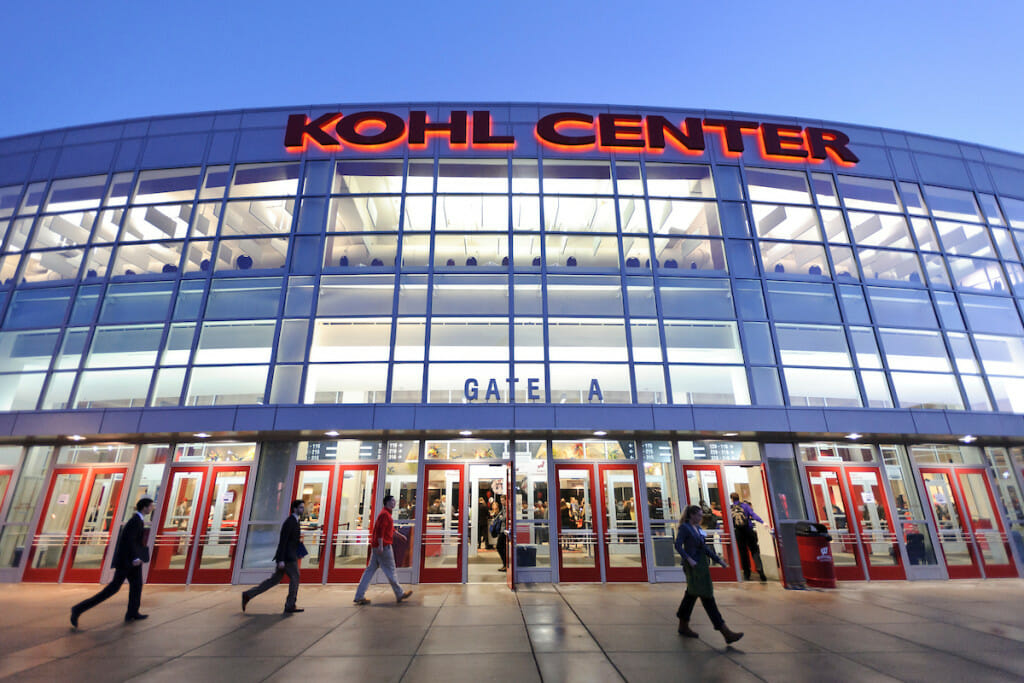How to get the most out of the campus career fair

A student shares a resume with a potential employer at a campus job fair.
Career and internship fairs offer an incredible opportunity for students and alumni to network, but it can be stressful for them to approach prospective employers.
Students can show their best side and reduce nerves with these tips from Bao Hoang, a junior business student at UW–Madison who has approached the fair many times herself.
Bao is the Career Closet Manager Intern at SuccessWorks at the College of Letters & Science and is cross-trained as a Peer Advisor to support students in their career and internship search processes.
“It was definitely a learning curve for me. Although we do learn about how to prep for the career fair in the business school, it’s very different when you apply the actual theory into practice,” she said. “I remember my first career fair, I was so lost and did not know what to even talk with the recruiters about. So I learned the hard way that you do have to actually prepare for career fairs beforehand.”
The UW–Madison All-Campus Career & Internship Fair will be from 4 to 8 p.m. Wednesday, Sept. 20, at the Kohl Center, with more than 200 employers expected to attend. The event is open to all UW–Madison students and alumni who graduated within the past two years.
So, how can students prepare effectively for the Career & Internship Fair?
Use available resources: In the days leading up to the event, SuccessWorks provides a variety of resources. Students can follow their Website guide, enroll in their Career Fair Preparation Canvas module and attend the All-Campus Career Fair Prep Night event on Sept. 19 from 5:30-7 p.m. at Gordon Dining and Events Center.
Dress appropriately: “I recommend business casual at most, maybe business professional if you want to go for it. Color-wise, something not too bright, more on the neutral colors. Make sure you are well groomed as you are making an impression,” she said.
As a part of her internship with SuccessWorks, Bao manages the Career Closet, where students can get up to four free items of professional clothing per semester, free to keep for anyone who may need assistance in finding appropriate clothing for career fairs.
Prepare an elevator pitch: After preparing to look the part, she advises that students then practice being the part. Baos says one way to prepare an elevator pitch — a short explanation of who you are and what you’re seeking, just long enough to last through a theoretical elevator ride.
“I would say to have a prepared list of bullet points of what you want to say. Those bullet points should include [your] name, year and major, why you are interested in the company and what you are looking forward to in this conversation with them.”
Practice it more than a few times.
“I would say to really practice your speech with a friend or out loud. Practice the grip of your handshake, your tone, and how you would express yourself. I would [also] practice relaying the same information in different variations as well, as you will need to cater them to whoever you’re speaking to,” she said. “Your elevator pitch will be the biggest impression that they will make of you.”
Print your resume: On the day of the fair, Bao recommends students print between 5-8 physical copies of a resume to hand out to employers and plan the time of attendance with care.
“It is better to come during the middle hours of career fairs, as during the early hours, the line would be overly long. I wouldn’t recommend coming in the last hour, as people are tired at that point and they’re probably waiting to pack up. So either get there really early and be in the front of the line, or go after the rush during the middle hours,” she said.
As Bao mentioned before, once students make it to the fair, the elevator pitch will prove essential in building effective networks with employers.
“Recruiters definitely want to see that you are passionate about what you are pursuing. So be sure to be clear in your elevator pitch why you are passionate about what you are interested in within the job, as well as how you [can] back up that passion with experiences.”
Prioritize your top employers: While it is overwhelming to attend a fair with over two hundred employers, Bao’s “tier list” strategy proves useful for students to emphasize the ones most important to their careers. Essentially, she sorts companies into three tiers: A-tier booths are top priority and B-tier are interesting but not crucial. Organizing companies by priority may help students tame the hectic environment of the fair.
Most importantly, Bao knows that students must be prepared to break out of their comfort zones.
“Be prepared to be extroverted,” she said.

The UW–Madison All-Campus Career & Internship Fair will be at the Kohl Center from 4 to 8 p.m. Wednesday, Sept. 20. Photo: Jeff Miller
Tags: job fair, successworks
